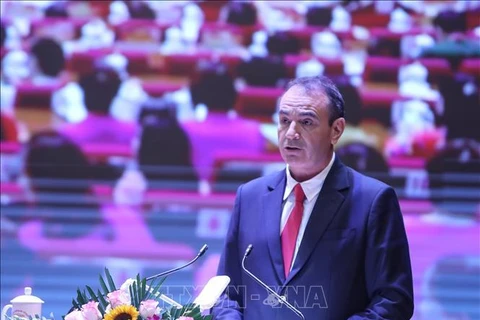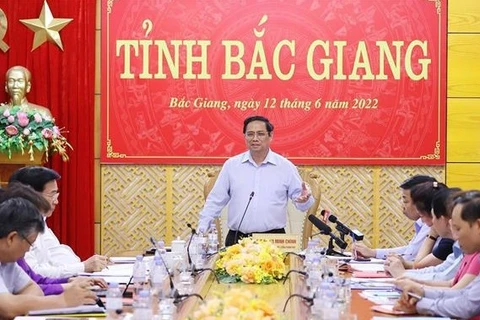Bac Giang (VNA) – The northern province of Bac Giang is planning to focus on accelerating digital transformation and building an e-administration, a digital economy and a digital society, according to the provincial People’s Committee.
The move aims to benefit both people and businesses, improve the effectiveness of local governance and boost socio-economic recovery. Priority will be given to healthcare, education, the environment and natural resources, industry and investment attraction, agriculture, transport and logistics, tourism, media, and the judiciary.
The province plans to transform its traditional postal service into a digital era that is a critical part of infrastructure for the digital economy to push for an e-administration and a digital society. It will digitally transition telecommunications infrastructure with the aim of expanding 5G service coverage to all residential areas by the end of this decade.
Bac Giang is also constructing and upgrading intra- and inter-provincial fiber optic cables to keep up with the growth of local broadband services and smart cities.
Telecommunication cables will go underground at all new industrial parks, residential and urban zones. To date, around 40 – 50 percent of the existing industrial parks, residential and urban zones have the cables installed and buried below the ground.
Between now and 2030, the province will focus its effort on expanding digital platforms, while applying new digital technologies in public administrative reforms, building smart cities and completing infrastructure for e-administration. It plans to develop a provincial data centre and database to boost key economic sectors. At the same time, a security operation centre will be established to facilitate the safe operation of e-government.
Additionally, it will also utilise the fourth Industrial Revolution (Industry 4.0) technologies to accelerate non-cash payments, automated environmental monitoring and electronic health records, while developing digital content, media and marketing and fostering the creative industry and digital content ecosystem.
There are currently five mobile network operators in Bac Giang with more than 1,400 Base Transceiver Stations (BTSs) and over 5,200km of cables, 10 percent of which are underground. The coverage of 3G and 4G mobile networks in the province has reached 100 percent.
All departments as well as district- and commune-level administrations have connected their LAN to the province’s WAN (CPNet) and two data centres.
The number of inquiries handled by its digital one-stop shop units has reached 100 percent. All governmental employees own a business email account for public duty. The province has granted over 4,500 digital certificates for local organisations and individuals, with all of the holders applying digital signatures.
Bac Giang is aiming to provide 100 percent of public services at Level 4 by the end of 2025 on various platforms, including mobile devices. Level 4 is the highest for online public services, which allows users to fill and submit forms and pay fees online.
Over 95 percent of the documents, applications at the provincial level will be handled online by then while the rates of documents and applications processed online at the district and communal levels expected to reach 85 percent and 65 percent, respectively.
By 2025, over 60 percent of inspection activities by state management agencies in the province will be carried out digitally. The digital economy will account for about 25 percent of the province's gross regional domestic product (GRDP).
Bac Giang will have over 800 digital enterprises and 100 percent of the households and all administrative units at communal level will have access to fibre optic broadband network by the same year. Two smart cities will be built in Bac Giang city and Viet Yen district.
A total of 440 IT and telecom firms are operating in Bac Giang, generating more than 124 trillion VND (5.35 billion USD) in revenue./.
The move aims to benefit both people and businesses, improve the effectiveness of local governance and boost socio-economic recovery. Priority will be given to healthcare, education, the environment and natural resources, industry and investment attraction, agriculture, transport and logistics, tourism, media, and the judiciary.
The province plans to transform its traditional postal service into a digital era that is a critical part of infrastructure for the digital economy to push for an e-administration and a digital society. It will digitally transition telecommunications infrastructure with the aim of expanding 5G service coverage to all residential areas by the end of this decade.
Bac Giang is also constructing and upgrading intra- and inter-provincial fiber optic cables to keep up with the growth of local broadband services and smart cities.
Telecommunication cables will go underground at all new industrial parks, residential and urban zones. To date, around 40 – 50 percent of the existing industrial parks, residential and urban zones have the cables installed and buried below the ground.
Between now and 2030, the province will focus its effort on expanding digital platforms, while applying new digital technologies in public administrative reforms, building smart cities and completing infrastructure for e-administration. It plans to develop a provincial data centre and database to boost key economic sectors. At the same time, a security operation centre will be established to facilitate the safe operation of e-government.
Additionally, it will also utilise the fourth Industrial Revolution (Industry 4.0) technologies to accelerate non-cash payments, automated environmental monitoring and electronic health records, while developing digital content, media and marketing and fostering the creative industry and digital content ecosystem.
There are currently five mobile network operators in Bac Giang with more than 1,400 Base Transceiver Stations (BTSs) and over 5,200km of cables, 10 percent of which are underground. The coverage of 3G and 4G mobile networks in the province has reached 100 percent.
All departments as well as district- and commune-level administrations have connected their LAN to the province’s WAN (CPNet) and two data centres.
The number of inquiries handled by its digital one-stop shop units has reached 100 percent. All governmental employees own a business email account for public duty. The province has granted over 4,500 digital certificates for local organisations and individuals, with all of the holders applying digital signatures.
Bac Giang is aiming to provide 100 percent of public services at Level 4 by the end of 2025 on various platforms, including mobile devices. Level 4 is the highest for online public services, which allows users to fill and submit forms and pay fees online.
Over 95 percent of the documents, applications at the provincial level will be handled online by then while the rates of documents and applications processed online at the district and communal levels expected to reach 85 percent and 65 percent, respectively.
By 2025, over 60 percent of inspection activities by state management agencies in the province will be carried out digitally. The digital economy will account for about 25 percent of the province's gross regional domestic product (GRDP).
Bac Giang will have over 800 digital enterprises and 100 percent of the households and all administrative units at communal level will have access to fibre optic broadband network by the same year. Two smart cities will be built in Bac Giang city and Viet Yen district.
A total of 440 IT and telecom firms are operating in Bac Giang, generating more than 124 trillion VND (5.35 billion USD) in revenue./.
VNA

























